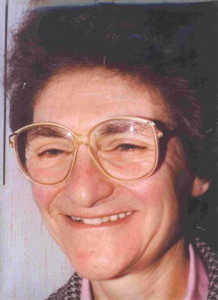Born in Vienna (Austria) on December 17, 1931, Anna Wahle was born into a liberal Austrian family. Although her parents were Catholics, her grandparents had been Jewish and, under the Nuremberg racial laws enacted by the Nazis, she and her family were considered Jewish for government purposes. Her parents (both professionals) thus decided to send her and her brother Franz to safety in England in January 1939, as part of the Kindertransport programme set up by the Quakers, to evacuate vulnerable children. She lived in England for the next eleven years, being educated in a number of convent-schools, including that of the Sisters of Sion. During that period, her parents (who had themselves been in hiding during the war years) remained in contact as much as possible, and provided whatever financial support they could to their children in England. Anna saw her mother once, briefly, in 1947.
In 1950, Anna returned to Austria, but the return to her birth family was painful and awkward: after 11 years living and studying abroad, she had come to feel more English than Austrian, and could no longer speak German fluently. She enrolled at the University of Vienna, studying mathematics and physics, and graduating in 1954. In February 1955, she entered the congregation of the Sisters of Sion, taking Hedwig as her religious name. She told friends that she felt “at home” in the Sion community, with its ethos of respect and love for Judaism and the Jewish people. For several years, Sister Hedwig would teach at girls’ schools in France and Austria. From 1962 to 1964, she studied Hebrew in Paris, and began her introduction to formal study of Judaism there, which she would continue at the University of Vienna’s Institute for Jewish Studies (she eventually retired from teaching, in order to pursue her graduate studies, research and writing full-time).
Hedwig was instrumental in founding Vienna’s “Information Centre for Jewish-Christian Understanding,” which opened in October 1967, and was modelled on the SIDIC Centre that the Sisters of Sion had founded in Rome the previous year, in the wake of Vatican II’s declaration Nostra Aetate. The Centre (which she headed until 1991) was a noted venue for academic study and lectures, organizing special events focussing on the Jewish-Christian relationship, and leading tours of significant local and international sites. Together with Dr. Kurt Schubert and Dr. Clemens Thoma, she co-authored a 1969 study on the presentation of Judaism in religion textbooks, sponsored by the Coordinating Committee for Christian-Jewish Cooperation, and she dedicated much energy to a revision and renewal of catechetical materials, in the light of Vatican II’s teachings. In 1972, she received her doctorate, with a dissertation on the topic of rabbinic anthropology; she would later also receive a Masters degree in theology.
Throughout Hedwig’s life, educating teachers and students remained one of her great passions. But her work at the Vienna centre also went hand-in-hand with a great deal of research and writing, stressing the areas of commonality between Judaism and Christianity, and calling on Christians to show esteem and love toward the Jewish people. In 1986, she published a book on parables in the teachings of Jesus and the early rabbis (Rabbinische Gleichnisse und die Gleichnisse Jesu), and co-authored (with Alexander Ronai) a second book, Das Evangelium—ein jüdisches Buch? Eine Einführung in die jüdischen Wurzeln des Neuen Testaments (Is the Gospel a Jewish Book? An Introduction to the Jewish Roots of the New Testament). She wrote articles about other dialogue pioneers, a 1988 book on the history of Hungary’s Jews, and a 1997 book, Juifs & Chrétiens en dialogue: Vivre d’une heritage commune (Jews and Christians in Dialogue: Living Out a Shared Heritage). In her final years, Hedwig asked to return to England—where she had spent much of her childhood, and where her brother Franz served as a priest—and it was there that she died, in London, on August 31, 2001. Out of the often bitter experiences of her youth, Sister Hedwig Wahle drew a passionate and pioneering spirit that made her a highly-respected leader in contemporary Jewish-Christian relations, with a legacy that continues today.
To learn more:
http://www.christenundjuden.org/persoenlichkeiten/hedwig-wahle
Sister Mary Kelly, NDS, “Remembering Sr. Hedwig Wahle”: http://www.christenundjuden.org/persoenlichkeiten/hedwig-wahle/341-remembering-sr-hedwig-wahle

